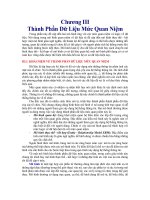Chuong 3 stream control transmission protocol
Bạn đang xem bản rút gọn của tài liệu. Xem và tải ngay bản đầy đủ của tài liệu tại đây (4.36 MB, 65 trang )
Chapter 13
Stream Control
Transmission Protocol
Objectives
Upon completion you will be able to:
• Be able to name and understand the services offered by SCTP
• Understand SCTP’s flow and error control and congestion control
• Be familiar with the fields in a SCTP segment
• Understand the phases in an SCTP association
• Understand the SCTP state transition diagram
TCP/IP Protocol Suite
1
Figure 13.1 TCP/IP protocol suite
TCP/IP Protocol Suite
2
Note:
SCTP is a message-oriented, reliable
protocol that combines the
good features of UDP and TCP.
TCP/IP Protocol Suite
3
13.1 SCTP SERVICES
We explain the services offered by SCTP to the application layer
processes.
The topics discussed in this section include:
Process-to-Process Communication
Multiple Streams
Multihoming
Full-Duplex Communication
Connection-Oriented Service
Reliable Service
TCP/IP Protocol Suite
4
Table 13.1 Some SCTP applications
TCP/IP Protocol Suite
5
Figure 13.2 Multiple-stream concept
TCP/IP Protocol Suite
6
Note:
An association in SCTP can involve
multiple streams.
TCP/IP Protocol Suite
7
Figure 13.3 Multihoming concept
TCP/IP Protocol Suite
8
Note:
SCTP association allows multiple IP
addresses for each end.
TCP/IP Protocol Suite
9
13.2 SCTP FEATURES
We discuss the general features of SCTP and then compare them with
those of TCP.
The topics discussed in this section include:
Transmission Sequence Number (TSN)
Stream Identifier (SI)
Stream Sequence Number (SSN)
Packets
Acknowledgment Number
Flow Control
Error Control
Congestion Control
TCP/IP Protocol Suite
10
Note:
In SCTP, a data chunk is numbered
using a TSN.
TCP/IP Protocol Suite
11
Note:
To distinguish between different
streams, SCTP uses a SI.
TCP/IP Protocol Suite
12
Note:
To distinguish between different data
chunks belonging to the same stream,
SCTP uses SSNs.
TCP/IP Protocol Suite
13
Figure 13.4 Comparison between a TCP segment and an SCTP packet
TCP/IP Protocol Suite
14
Note:
TCP has segments;
SCTP has packets.
TCP/IP Protocol Suite
15
Note:
In SCTP, control information and data
information are carried in separate
chunks.
TCP/IP Protocol Suite
16
Figure 13.5 Packet, data chunks, and streams
TCP/IP Protocol Suite
17
Note:
Data chunks are identified by three
identifiers: TSN, SI, and SSN.
TSN is a cumulative number
identifying the association; SI defines
the stream; SSN defines the chunk in
a stream.
TCP/IP Protocol Suite
18
Note:
In SCTP, acknowledgment numbers
are used to acknowledge only data
chunks; control chunks are
acknowledged by other control chunks
if necessary.
TCP/IP Protocol Suite
19
13.3 PACKET FORMAT
We show the format of a packet and different types of chunks. An SCTP
packet has a mandatory general header and a set of blocks called
chunks. There are two types of chunks: control chunks and data chunks.
The topics discussed in this section include:
General Header
Chunks
TCP/IP Protocol Suite
20
Figure 13.6 SCTP packet format
TCP/IP Protocol Suite
21
Note:
In an SCTP packet, control chunks
come before data chunks.
TCP/IP Protocol Suite
22
Figure 13.7 General header
TCP/IP Protocol Suite
23
Figure 13.8 Common layout of a chunk
TCP/IP Protocol Suite
24
Note:
Chunks need to terminate on a 32-bit
(4 byte) boundary.
TCP/IP Protocol Suite
25









